during the 2004 World Cup of Hockey
Thursday, January 26, 2017
1977-78 CHZ Litvinov Ivan Hlinka Jersey
One of the most important figures in Czech hockey history, Ivan Hlinka was born in this date n 1950. He began to play in the CHZ Litvinov youth program and eventually graduated to the senior team in the Czechoslovak league at the age of just 16 in the 1966-67 season, where he became a mainstay for the club for the next 15 seasons. A center, he was an offensive force in front of the opponent's net, using his 6' 2", 220 lbs frame to his advantage. By his second full season he was now averaging more than a point per game, with 17 goals and 34 points in 33 games in the shorter Czech regular season.
Hlinka as a member of CHZ Litvinov
At the age of 20, he was named captain of Litvinov and also made the first of many appearances for the Czechoslovakia National Team when he participated in the 1970 World Championships.
His standout seasons for CHZ Litvinov included 1974-75, with 36 goals and 78 points in 44 games, and 1977-78, with 32 goals and 71 points in 43 games when he won the Golden Hockey Stick as the best player in Czechoslovakia. In all, Hlinka had two 70 point seasons, six seasons of 50 or more points and 11 seasons out of 15 with more than a point per game and 10 with 20 goals or more with a high of 39, all while never even playing as many as 45 games in a single season.
In all, he would play 544 games in the Czechoslovak league, scoring 347 goals.
Wearing the black and yellow of Litvinov
On the international stage, Hlinka participated in the World Championships 11 times from 1970 to 1979 and again in 1981, including winning gold as world champion in 1972, 1976 and 1977, silver in 1971, 1974, 1975, 1978 and 1979 and bronze in 1973.
He also participated in two Olympic Games, coming away with a bronze in 1972 in Japan and silver in 1976 in Austria. Additionally, he played for Czechoslovakia in the inaugural 1976 Canada Cup tournament where Czechoslovakia advanced to the tournament finals against Canada. From 1977 to 1980, he also served as captain of the national team, which included winning the world championship in 1977 and two silver medals in 1978 and 1979.
Change came in 1981, when Hlinka and Jiri Bubla were the first two players given permission to leave for North America, where they joined the Vancouver Canucks of the NHL. There, Hlinka, admittedly a veteran player at the age of 31, set a Vancouver record for most points by a rookie when he notched 23 goals and 60 points in 72 games. During the playoffs, he would add another 8 points in 12 games as the Canucks would advance to the Stanley Cup Finals against the New York Islanders, who were in the second year of their four year dynasty, making he and Bubla the first Czechs to compete for the Stanley Cup. His second season with the Canucks was equally as successful, scoring 19 goals and 44 assists for 63 points in 65 games played, good for fourth in team scoring. While in the NHL, he would play in 137 games, scoring 42 goals and 81 assists for 123 points.
He would return to Europe for the 1983-84 season, joining EV Zug of the second division in Switzerland, where he set career highs with 46 goals and 89 points in 41 games. One more season with Zug saw him score 30 goals and 73 points before retiring as a player to enter the world of coaching.
He began with a return to Litvinov in 1985-86 and briefly came out of retirement to help Litvinov escape the cellar in 1986-87 when he skated in 19 games, scoring 23 points as Litvinov responded with an eight game undefeated streak.
Aside from coaching Litvinov, he also worked for Freiburg in Germany before becoming the head coach of first the Czechoslovakia National Team and then the Czech Republic National Team. His teams would win bronze at the 1992 Olympics and 1992 and 1993 World Championships. After the 1994 World Championships, he would leave the position, only to return again in 1997, winning bronze yet again. Finally in 1998, a gold medal arrived at the 1998 Olympics in Japan, the first Olympic hockey tournament open to the best NHL professionals. After a bronze at that spring's World Championships, the Czechs returned home from the 1999 World Championships with gold in hand.
Hlinka celebrates the Olympic gold medal with Martin Rucinsky
Hlinka then became only the second European to coach an NHL team when he took over as head coach of the Pittsburgh Penguins for the 2000-01 season, guiding the club to the conference finals following a 42-28-9-3 record, knocking off two higher seeds in the process. Unfortunately, all was not well in Pittsburgh, and the club traded superstar Jaromir Jagr before the start of the following season, which began with the club losing it's first four games. That combined with not seeing eye to eye with team owner and star player Mario Lemieux, led to his being relieved of his duties.
Hlinka coaching the Penguins
He once more returned to the Czech Republic National Team, first as General Manager for the 2002 Olympics and World Championships before becoming head coach of Avangard Omsk of the KHL for the 2002-03 season.
He then became the head coach of the Czech Republic National team once again in 2004, but sadly, just six weeks prior to the 2004 World Cup of Hockey, Hlinka was killed in a car accident on August 16, 2004 at the age of 54.
As a tribute to Hlinka, the Czech Republic National Team wore a #21 Memorial patch during the tournament, and team captain Robert Reichel changed from his customary #21 to #22 in Hlinka's honor.
The #21 Memorial patch worn on the Czech Republic jerseys
during the 2004 World Cup of Hockey
during the 2004 World Cup of Hockey
Hlinka was inducted into the IIHF Hall of Fame in 2002. Beginning in 2007, the Ivan Hlinka Memorial Tournament is held in the Czech Republic and Slovakia for under-18 national teams every August in his memory. Also, Litvinov's home arena was renamed in his honor and is now known as Ivan Hlinka Stadion where his retired sweater #14 hangs from the rafters.
Today's featured jersey is a 1977-78 CHZ Litvinov Ivan Hlinka jersey. Done in the classic Czech style of the 1970's this jersey features a lace-up collar and drop shadowed names and numbers with a typically "European" font for the numbers.
Bonus Jersey: Today's first bonus jersey is a 1976 Czechosovakia Ivan Hlinka jersey as worn in the 1976 Canada Cup tournament. The Czechs alternated between read and blue road jerseys throughout their history of international hockey, dating back to 1921. They wore blue from 1964 to 1972 before reintroducing red in 1973. They also had a history of switching between their heraldic lion crest and the initials CSSR, changing to the combination of the lion crest and red sweaters in 1975 in time for the 1976 Canada Cup tournament. They maintained that combination until 1990, when they changed to a vertical Czechoslovakia flag for their crest.
This jersey also demonstrates the Czech style of the era, with it's lace-up collar flanked by vertical striping and drop shadowed numbers, now in three colors with the name given a radially arched treatment.
Extra Bonus Jersey: Today's additional bonus jersey is a 1981-92 Vancouver Canucks Ivan Hlinka jersey. What must have the foreign Hlinka and Bubla thought when they first laid eyes on the Canucks controversial "flying V" jerseys after years of wearing the prototypical Czech signature style? First introduced in 1978-79, this jersey was a radical departure from anything previously seen and still one of the strangest and unforgettable jerseys to ever see the ice in an NHL contest.
Designed by a professional psychologist, the "V" striping, suggesting "victory" according to the designer, was executed in bright orange to "evoke passion and aggression" while the use of black would instill fear in the opposition.
The sleeves also featured smaller "V" shapes midway down the arm with a new "Flying Skate" logo for the shoulders and the very unusual placement of the sleeve numbers at the very bottom of the arms on the wrists!
The basic jersey produced in 1978 remained in use until the 1984-85 season, but with a few adjustments along the way, such as a change in color for the names on the back and outlining the original one color numbers, both of which occurred for the 1981-82 season as seen here.
In our video section today, we begin with key moments from every Czech Republic game of the 1998 Olympics, which was coached by Hlinka. Note Reichel wearing #21, which he would later relinquish after Hlinka's passing in 2004.
Next, the raucous press conference the Czech team held upon their return from Japan after winning the gold medal. While it's in Czech, you can tell that Hlinka had the press eating out of his hand at the event.
Labels:
CHZ Litvinov,
Czechoslovakia,
Hlinka Ivan
Subscribe to:
Post Comments (Atom)

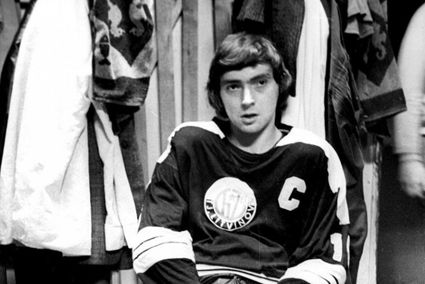
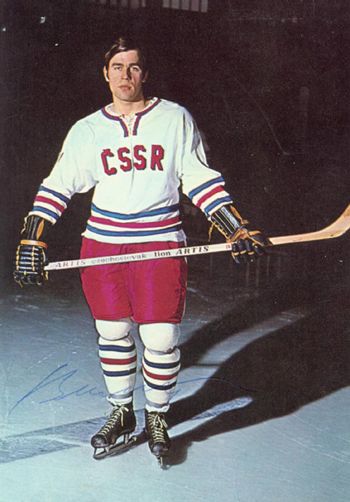
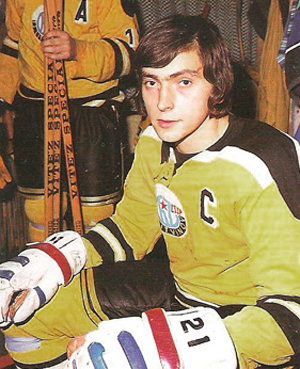
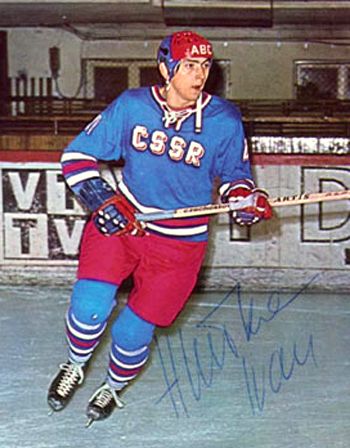
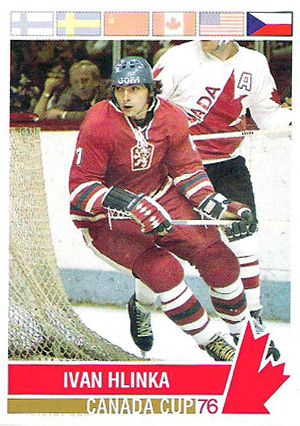
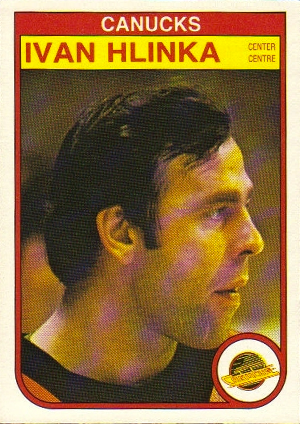
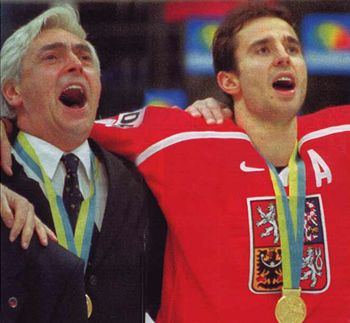
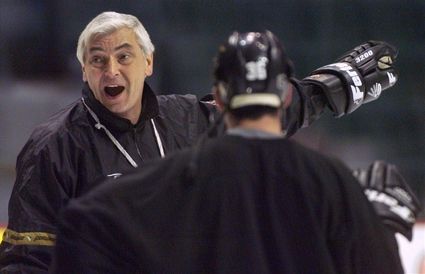
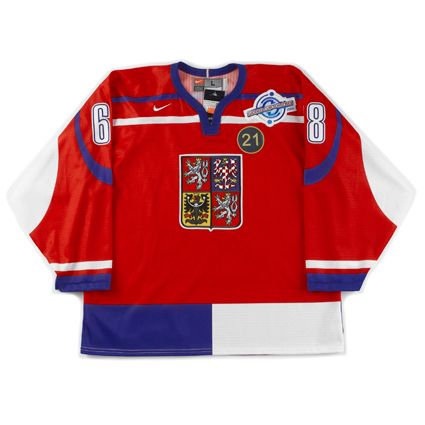
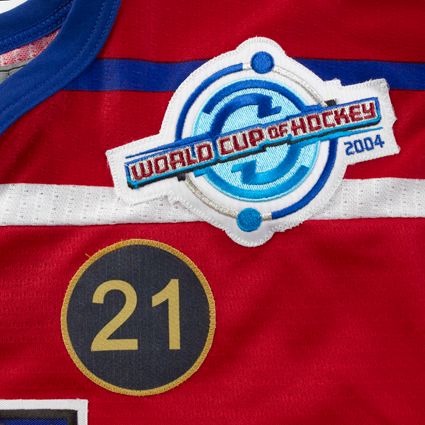
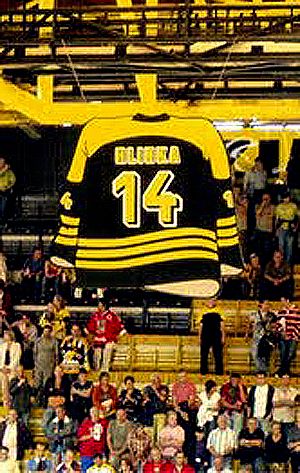
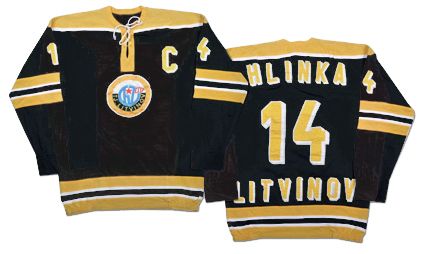
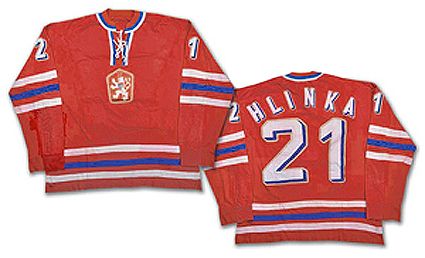
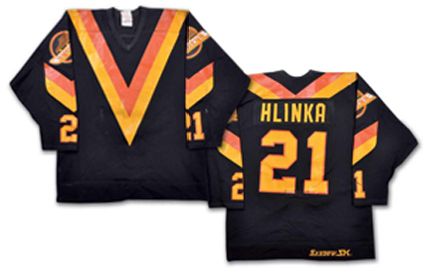










No comments:
Post a Comment
We welcome and encourage genuine comments and corrections from our readers. Please no spam. It will not be approved and never seen.